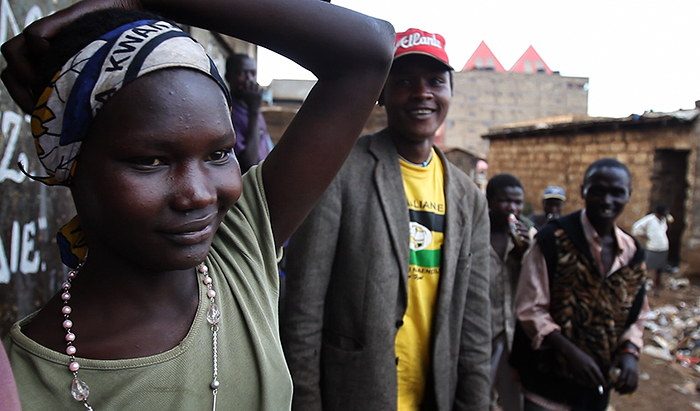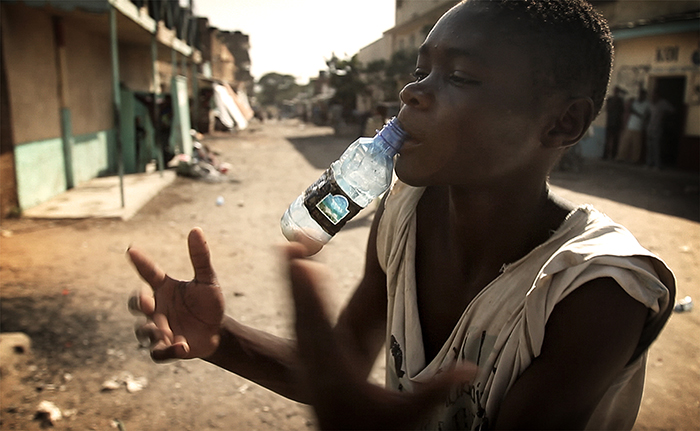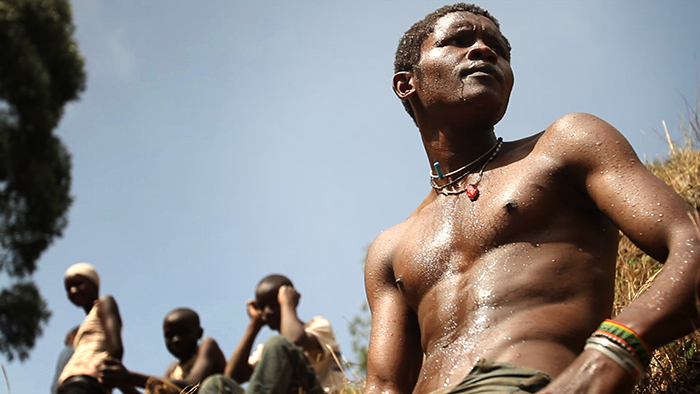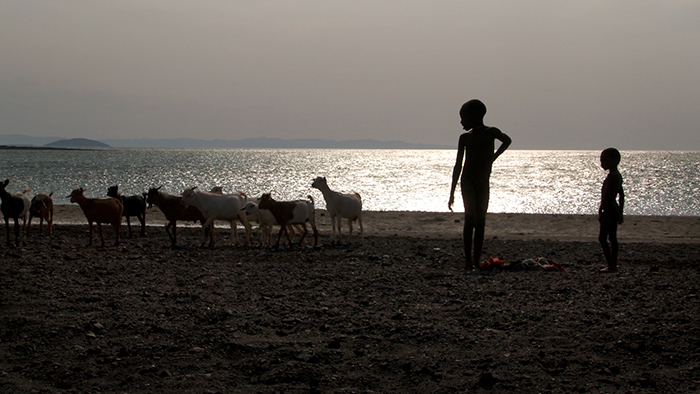First Look: Tough Bond Documents Displaced Youth in Kenya

New BitTorrent documentary Bundle from 108 Media puts a lens on African urbanization – and asks viewers to help.
In 2009, Anneliese Vandenberg and Austin Peck bought a one-way ticket to Kenya. They dedicated themselves to working locally with the communities- understanding their ways of life, their beliefs, and offering a helping hand whenever they could. Along the way, they met a group of kids with stories they couldn’t ignore. They became friends and started filming — capturing the apocalyptic reality of displaced youth; the bonds broken by urbanization, and the communities rebuilt.
Tough Bond is the name of the glue that bonds Kenya’s street kids together; the thing they huff to numb themselves against the pain of poverty. It’s all they have. This is the true story of four kids who abandoned broken villages and fled to the urban wilds in search of a new way to survive. Without tribe, community, or government, they build their own parallel world in the streets. They build back their family and become their own tribe, “The Survivors”.
It’s a tough bond that connects us all. It can’t be ignored. And neither can this documentary. Tough Bond debuts on iTunes. And in partnership with the filmmakers and 108 Media, we’re offering an exclusive first look: including the first fifteen minutes of the film, five stills, a free song and more. And we’re offering you a chance to help.
Our goal is to bring the film back to Kenya. Traveling through critical cities and villages, Tough Bond will screen for free, in open public space raising awareness and inspiring communities to take action to rise up and celebrate their children.
Every share is an opportunity to unlock change: you can help provide funding from inside the Bundle.

Get Involved.
Words With Anneliese Vandenberg & Austin Peck: On Documenting City, Family, and Other Tough Bonds in Modern Africa
BitTorrent: In 2009, you bought a one-way ticket to Kenya. Did you go there knowing that you’d be making a film? How did the documentary begin to take shape?
AV / AP: We were searching to understand why humans live so differently around the world and what these differences mean for a global humanity. We brought a video camera to play and capture our experience. We had no idea we would create a feature-length film.
We had been in Kenya for about 3 months before we began filming Tough Bond. Previously, we were in the arid north delivering relief food to a needy Turkana village, and what we discovered there shocked us. The complex relationship between foreign aid and the erosion of the traditional village is pushing many people from their traditional ways of life. With resources taken by foreign contractors or re-appropriated for urban development- the tribes have the choice to remain in the villages surviving with dwindling resources, waiting for USAID to come with weekly food rations, or they can leave the village and flee to the urban city streets to look for a new way to survive.
In Isiolo, the nearest town to our relief work, you couldn’t walk the streets without seeing at least a dozen children between 3-20 years old huffing glue; passed out along shop fronts. We were heartbroken to see these children suffering, and ignored. And we began to talk with them to understand how this could be a reality. After a month of listening to their stories with painful curiosity, we found ourselves obsessed and in love with these resilient kids; full of humor and strength, despite their difficult situation. The communities have pushed these children deep into the shadows; their story silenced by the dominant international rhetoric of urban development and individual progress. Communities no longer regard them as children. The more we understood where they came from, how they survived and how they kept themselves so vibrant despite hunger and tragic child abuse, the more it became clear that they held the answers to many questions regarding our modern human experience and what keeps us so separate from one another. We knew we needed to share this with others and create an intimate film of their story.

BitTorrent: How has urbanization changed Kenya?
AV / AP: The obvious consequence of urbanization in Kenya is a widening separation between humans and the environment. The country’s biggest supermarket franchise sells bananas double-bagged in plastic. Those bags choke the rivers that should nourish the Del Monte banana plantations. These conundrums abound in Kenya. It’s not going to end well, and it’s happening everywhere. But when the traces of a life in balance with nature remain so hauntingly present as they do here in Kenya, echoes lingering from less than a generation ago, it feels like the chasm is opening right under our feet. Kenya is a place where one can see where we’ve all come from, and simultaneously, perhaps where we’re all headed.
Urbanization in Kenya is reckless, ill-designed, and steams ahead with drunken disregard for the natural environment and our sustainable existence within it. The driving force of urbanization in Kenya today is the same sensation that took King Leopold of Belgium deep into the heart of the continent 100 years ago. Greed. On one level, urbanization in Africa is a neutral term for the process of laying the infrastructure of extractive industries. On another level, urbanization in Kenya is the by-product of human displacement from rural agrarian zones. When multinational corporations own an increasing share of the arable land, Kenyans face the choice of laboring for those corporations or heading to the city to carve out another existence. People are making a survival decision and thus, the cities grow. Traditions disappear. Knowledge is lost. Priorities change.
A nation once comprised of diverse cultures becomes culturally homogenous, and is now instead divided by wealth and class.
It’s particularly acute in Kenya because of her relative stability in the region. There are goodies strewn all across North, East and Central Africa, but there few regimes in the region that can offer China the stability necessary to build roads and railroads or to entice European and American oil giants to invest in pipelines and refineries to get those goodies out. From the doorstep of the common man here in Kenya, he can only say that the new roads have simply summoned more vehicles. The new housing projects have merely spawned more slums.
BitTorrent: The idea of “family” is something that’s being redefined around the world. In what ways are Nairobi’s displaced youth reshaping the meaning of tribe, and community?
AV / AP: The “Survivors” are incredibly progressive in their social identity. In a world where national borders separate us from our brothers and sisters, and specifically in Kenya, where tribal affiliations still summon deadly war and neighborhood divisions- the “Survivor” tribe is comprised of kids from many different tribes with arms open to those interested in bonding through their experience rather than a socially inherited label. They laugh at the turmoil that occurred in the 2007 election violence, explaining how Kenya has yet to understand humanity given they kill each other because they are from different tribes yet they are running as candidates to represent the people on a national level.
The “Survivors” define family as humans surviving on this earth any way and wherever they can. They inherently are apart from any regular division based on resource or social structure as their communities have pushed them out of it. The “Survivors” are in essence singing the same song as our global visionaries: “I have a dream that one day this nation will rise up and live out the true meaning of its creed: We hold these truths to be self-evident, that all men are created equal.” – Martin Luther King
BitTorrent: This film is remarkable for its visceral proximity: you aren’t filmmakers / subjects, but instead: family. How did you achieve this?
AV / AP: In one word, Respect. We had one rule while in Kenya, and it was to be as local as possible. When we arrived to Isiolo, everyone in town was very perplexed as to why tourists would come and rent an apartment in the slum, rather than going to the hotel where every other foreigner spends their time if they happen to pass through Isiolo. This gave us a sort of street cred, and the kids were very curious to know what we were doing. We began with small talk. They would tell us false stories of being orphans and other horrors; they had learned most tourists would give them money for this. After a few weeks, we started slowly gaining respect and began learning their deeper story: the reality that most of them have families that came from the villages.
After the first year, we developed a very strong, trusting relationship with the characters in the film. We often slept under the same roof and shared our own personal stories with them, just as they did with us. We realized they are just like us. Our walls of separation had been broken and we found friendship rather than ‘filmmaker’ and ‘subject’.

BitTorrent: This is an incredible time for documentaries; with films like The Act of Killing breaking the conventions of true-life storytelling. When it comes to Tough Bond, what was your approach? What do you see as the role of documentary film?
AV / AP: Our filmmaking approach evolved throughout the years of production all the way through the final edit. Looking back, our process was less of a conscious assembly of a story than an attempt to record an experiential reality. The final form is a result of trying to figure out how we can bring an audience to where we were; to the questions we faced.
There are other films of the last few years like Darwin’s Nightmare, Leviathan and Hell and Back Again that did marvelously what we wanted to do. They are films that grab the audience (who weren’t actually there in Tanzania, Afghanistan or onboard a commercial fishing vessel) by the collar and plunge their head in the bowl and make them feel it. We tried to do little explanation and little resolution. We’re still struggling with those issues now. We couldn’t have wrapped them up in the space of a film. We wanted the end result to be a feeling; an experience. We wanted to give the audience to have the space to process it on their own. Our characters were our shepherds into a new reality and our camera became the equivalent of a black box recorder that would survive the process of crossing through dimensions.
The role of documentary is an impossible thing to assign. Documentary films are just as much artistic, existential or intellectual expressions as any other art form. They are ultimately as unique and precious as the sound of someone’s voice. What is the role of our voice?
BitTorrent: What is your goal for Tough Bond? What happens next?
AV / AP: Our goal for Tough Bond is to get it seen everywhere here in Kenya, and to use it to trigger a conversation about what’s going on — illuminating the connection between urbanization, the collapsing villages, the decay of families, and the emergence of a generation of drug-addicted children raising themselves in the streets. Tough Bond has been surprisingly entertaining to Kenyan audiences who presumably rarely see nuances of their life shown in the form of verite documentary. We think we have a unique instrument with this film to bring people together in a non-threatening way, to confront an aspect of modern society that is normally ignored. To do this, we’re going to tour the film around Kenya from the villages to the slums and do community screenings and discussions. The tour is a powerful and novel approach here. It will create a stir and with some luck, Tough Bond will be seen on Kenyan national television. There are legions of kids just like the ones in our film who deserve at least an acknowledgement of their humanity. They too can be heroes.

About BitTorrent Bundle
BitTorrent Bundle is an Alpha project, made with and for the web’s creative community. Our mission is to help artists connect directly with fans, inside the content they share.
Each BitTorrent Bundle allows artists to distribute content directly to the Internet. And each Bundle comes with a key. Fans can unlock artist content with an email address. The idea is to make each song a storefront, and each file more valuable, each time it’s shared. Got ideas for the next BitTorrent Bundle? Hit us up.







